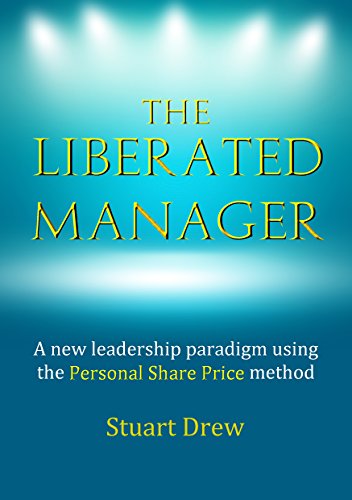The market is flooded with many self-help books for managers who want to better their game. However, very rarely does one find a new paradigm within which, one can view performance. The Liberated Manager by Stuart Drew draws on the author’s extensive experience and introduces the concept of “Personal Share Price” in order to understand how much a manager is really valued by those around him- and how he can amp up his performance.
Bookedforlife in conversation with Stuart Drew….
The USP of the book lies in the concept of Personal Share Price. Tell us about what led you to formulate this very specific measurable way to gauge one’s own individual ‘worth’ in the context of what one brings to the job?
I wanted to help managers and others come to terms with their MADness. MAD is short for Make a Difference. Whether you are in a new role or you have been promoted the expectation is that you will make a difference. How the difference can be achieved and measured became the question. In the past managers were exclusively measured by their boss, particularly in hierarchical companies, which most were, where teams operated in silos. People were subject to annual appraisals based on performance against set objectives.
This environment made it very difficult to add value in the short term as it happened once a year or half year at best. Business is now more global than ever, more dynamic and subject to acceleration in technological development and innovation. Basically, it is very different from the past and people are subconsciously measured on a regular basis, weekly or monthly. The phrase that ‘you are as good as your last performance’ captures the image and is relevant for today’s business environment.
Managers are now measured by the people they work with at each interaction: customers, peers, bosses, other teams they work with, team members, support functions and the like. Furthermore, I believed people could take much more personal responsibility for making a difference on a day to day basis. I thought about how companies were measured and recognised that quoted companies are measured on a daily basis through their share price. There for everyone to see. A company’s share price is not just about performance but, strategy, expectation, sentiment and positioning among other metrics. A brand is enduring but a share price fluctuates daily.
Once I had this concept I applied it to my team in the form of a Personal Share Price (PSP). This promoted the idea that one’s own, behaviour, presence and performance combine to enable people to make a difference. Being conscious of the PSP concept encouraged managers to adjust their behaviour to circumstances, develop their presence and deliver differentiated performance, and it worked! The PSP concept also allowed me to focus on the issues and concerns most managers suffer, that limit performance.
Thus, I asked myself how could managers liberate themselves from burdens and release the full potential of themselves and their teams. Liberation from things like having to have all the answers to team issues, liberation from risky hiring, liberation from worrying too much and negativity, liberation from one’s own cultural heritage, liberation from tethered (past) thinking, liberation from coming second too often in sales. This led to the book entitled The Liberated Manager – A new leadership paradigm using the Personal Share Price method
When we think of corporate environments, the concepts of cut-throat competition and varying agendas, office politics and so on comes to mind. You say in the book, “facilitating this growth of one’s colleagues is the ultimate reward in management,”. How can modern organisations adopt this outlook change?
The negative concepts you mention have one thing in common- people. It is people that create cut throat competition, people that have varying agendas and people that operate office politics. Therefore, the modern organisations need to create an environment that is based on an open transparent meritocracy. This is particularly important where the workforce employs a large number of the so-called millennial generation. These younger people are not motivated by the prospect of a job for life, do not want to sit quietly and accept the status quo, and are less likely to follow the path of their parent’s advice. They want to be empowered and make a difference.

Through social media they are connected in ways unavailable to previous generations and they have a global outlook from news, the internet, and technology. I have witnessed a global conversion of younger people. Jeans, T-shirts and sneakers are the international dress code. Pop music stars and entertainers are present across the world. Thus, organisations need to understand this represents the future ‘operating environment’ and adopt appropriate policies.
I ask myself why did the #MeToo movement start. One could argue because a failure of corporate governance. When harassment and abuse were out in the open, the movement went viral, globally in a heartbeat. Once again it is all about people, how they behave and what is deemed acceptable or not. Thus, a manager’s true role becomes one of setting appropriate examples of openness and transparency, empowering others and promoting the notion that everyone is better than they think they are.
Thus, liberating people from real or imagined burdens and encouraging a self realisation of one’s own PSP through behaviour, presence and performance allows a manager to facilitate the growth of one’s colleagues and is the ultimate reward of management. In summary, organisations need to operate a meritocracy with a foundation of trust, openness and transparency. Only people can do that!
The Liberated Manager also alludes to the present work environment world over which is a constantly changing one. You also emphasise on the need for this change. How should managers be in tune with the changes that mark today’s times?
With the geopolitical environment changing ever more quickly and with more unpredictability, the key skills of a manager become to remain relevant and adapt to circumstances. Remaining relevant is now more important than ever. There is no alternative or excuse when the online world offers endless opportunities to seek opinion, research alternatives and study almost any subject in depth. The appetite for knowledge needs to be tempered with an ability to sift truth from fiction and news from fake news. ‘Google it’ has become the daily recourse to knowledge.
These same dynamics are also making the world more unstable. Managers therefore need to learn to adapt to circumstances like never before. The China slowdown, the threat of international trade wars, nationalisation-imposed tariffs to protect dying industries, Brexit, global financial crisis are examples of the unpredictable world we live in. At a more local level a company setting up a campus near yours will distort the labour market for months or years. Thus, the skill is to study trends early in their development and adjust plans to maintain or improve outcomes.
Therefore, managers should not become slaves to the path they declared at say the beginning of the year. Informed managers will be able to assess threats and opportunities early and act as ‘the go to person’ for advice. This is not a dependency on seniority; junior managers can in many ways see trends earlier if they are close to the ground. Those under the age of 30 years are also better at innovation, think, Google, Amazon, Tesla, AirBnB, and mobile only banks. These are facilitated by young industry disruptors. The trick for them, think Bill Gates, is to remain relevant or become a philanthropist!
You discuss various points that lead to being a liberated manager, and in turn contribute positively to your Personal Share Price. I found the section where you discuss animal behaviour and what we can learn from their instincts quite interesting, and easy to remember as well! Can you tell us a bit more about that?
We are all limited in some way or other and age does not make it easy for us to maintain the carefree, all things are possible, ideas of our youth. However, because the change is gradual, we are less likely to witness the change ourselves. Do you real look older every time you look in the mirror? Meet someone you have not seen for years the change is obvious.
Sometimes trying to look from outside-in can reveal changes you had not perceived before. The same applies to analogies. Our ability to cope with change is an increasingly important facet of management. Furthermore, our ability to recognise changing patterns and adapt our behaviour and performance is even more crucial in today’s dynamic business environment. The paradox is that we learn from our experiences and that, in turn, moulds our behaviour. Unlearning experiences and being open to new ideas, probably not yours, are the more important skills for the future. This is frequently the frustration between generations in families.
To illustrate these issues and their impact on PSP, I found that a comparison with some animal behaviours helped me understand how I could better deal with work demands, keep up with change, and encourage innovation. The idea that we limit our own possibilities as we get older reminded that elephants that are tethered in their youth and are conditioned to the tether even when they are strong enough to free themselves. People who seem to be carry the world’s problems on their shoulder got me thinking about carrying monkeys on their back. Some people carry a lot of monkeys and it shows. People who resist change at all costs reminded me of the dinosaurs that became extinct through a catastrophic change in their environment, and the efficiency of birds flying in formation helped me appreciate how efficient true teamwork can be. Thus, I would encourage anyone to try to externalise characteristics that limit one’s potential to make the most of life in business and outside. Do you know a Sloth? Is there a Cheetah in your workplace? And remember Wales eat Plankton! So, you can grow big by the smallest things.
Readers who will read this book would be earnestly looking for change in the manner they currently function. Any tips from your side on how they should approach the book? How could they maximize what they get from the book?
For those, having read the book, who wish to become liberated managers, there is no better place to start than the chapter on 30-60-90 day plan towards liberation. This details what actions can be taken to arrive at MADness at its earliest. That is, Making A Difference. After all the only reason someone is hired or promoted is the belief that they will make a difference. For someone in a role for some time who wishes to become a liberated manager I suggest a declaration of a change and request for support from team members, boss and peers. This declaration can be followed by the 30-60-90 day actions.
Lastly, while the book speaks to a global audience, it is also true that your work experience specific to India has been vast. You make a special mention of the country in the book as well. Since this blog is rooted in the country, any message specifically for our readers in India?
I have visited India over 100 times in 14 years on business and vacation with my wife. A century in cricket, the most venerated sport in India, is recognised as a significant achievement. I am proud of achieving my century. My wife and I have participated in Aarthi at Rishikesh and Holi in Narendra Nagar. We were at Fisherman’s Cove 8 days before the tsunami and we have shopped in Palika Bazaar in Delhi. We were in Kerala for an elephant festival and visited the golden triangle cities. One of our most memorable experiences was a private dinner in the middle of the lake in Udaipur surrounded by fireworks celebrating the maharaja’s birthday.
These experiences and many, many, more gave me a fondness for India and Indian people that is a joy in my life. People in India are completely dedicated to providing excellence in all they do. From bus boys in hotels to IT delivery managers, from retail sales assistants to taxi drivers. The work ethic also comes with no complaints and a smile. The willingness to do one’s duty, alive and well in India is sadly disappearing elsewhere. The commitment to learning is endemic and I know that even the poorest families seek to put something aside for their children’s education.
One thing I witnessed over recent years is the developing appreciation of the contribution of women in the workplace. This should continue to be encouraged, with more rising to senior positions. My summary message to your readers in India is thank you for helping me become a better manager by your example of dedication, enthusiasm and willingness to innovate. India is in good hands and all things are possible in India. I hope many of you become liberated managers and deliver sustainable differentiated performance through empowering your teams!
With that, we sign off after a power-packed conversation! Here’s to all our future ‘liberated managers’! May your Personal Share Price only increase!
For more information, you can visit
https://theliberatedmanager.com/
Title: The Liberated Manager
Author: Stuart Drew
Publisher: www.publishnation.co.uk
Genre: Business




